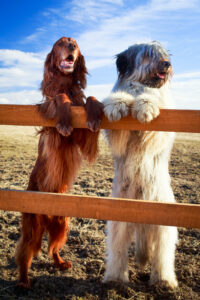Barks Blog
Do “Carbon Copy” Dogs Exist?

We love our dogs so much, but sometimes there is that one dog who just sort of raises her head just that little bit above the parapet and eats her way into our heart that bit deeper. Or maybe we’ve battled more with that one dog to overcome behavioral or medical struggles…It’s not always easy to pinpoint but it’s that unidentifiable ‘something’ that makes some dogs shine just a bit brighter in our memory.
The pain of losing a dog is immense and it can take time to heal emotionally and get to the point where we are ready to allow another dog into our heart. Sometimes, however, we may find it difficult to accept a new dog because we’re torn between feelings of love for the new arrival and also guilt – both for feeling that love and for moving on as it were. These are complex feelings and can make it challenging to accept our new dog for who he or she is, as ‘an individual.’
We may still be living in the memory of our previous routine – when our previous dog ate, what she ate, when she went for walks, her little foibles, what she did and didn’t do, how quickly she was house trained etc. If our new dog isn’t the same, we may start comparing how quickly our old dog completed learning skills, or be worrying about the fact our new dog is growling when we ask him to give up a toy, all the while thinking, ‘but our Rex never did that!’
Comparing two dogs is tempting but we must try to separate our feelings and see each for who they are. None of us are alike and neither are our dogs. Training may take longer if our new dog is more highly aroused than our previous dog. We may have to work harder to achieve the results we want.
If we’ve been in a breed for years, as I have been with Labradors, it’s can be even harder to deal with idiosyncrasies when they are well developed. So often I have been met with the line: ‘I’ve had (slot in your breed) for 30 years and I’ve never struggled so much with a dog!’
For me, the most difficult thing to work with is helping dog guardians understand that what they expect their new dog to do ‘just because Rex did it’ may not work for their new dog. These can be really simple things, like their previous dog might have loved climbing onto their lap in the evening for a cuddle or might have loved fetch games.
But now they have a dog who will not retrieve a ball and prefers resting in his own space and coming for attention when he’s ready. This can cause upset because he doesn’t instantly fit the guardian’s picture of their ‘ideal dog.’
What we have to understand is that we cannot force a dog into our preconceived ideal as to how he should behave or what he should be. Most of us would not appreciate being dictated to, being told we should be this, or we should do that, and this is a similar scenario. Unfortunately, we don’t, as guardians, always understand or listen to what our dogs are saying.
We may, with time, be able to teach a fetch and retrieve, but some dogs may always be uncomfortable about close contact, guardians approaching head on, being confined, being expected to be cuddled on sofas/beds etc. and we have to respect this.
We owe it to our dogs to understand exactly how they tick, what motivates them, and what are their likes and dislikes. If things are not happening as we hope, then we need to sit back and ask why. Then, we need to put in the time to work through a solution so we can understand each other better and improve our communication. A blissfully easy existence with a previous dog may not be replicated the next time around – but it can also work the other way. For example, a new dog may be really easy compared to a previous fearful, reactive, anxious individual with whom we had to do a lot of work and constantly manage his environment.
Whatever the case, it’s all part of living with and loving a dog (or any pet) and it’s our responsibility to make sure we respect each animal as an individual and put in maximum effort to ensure their life is as happy and richly rewarding as can be.

